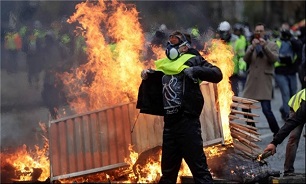France to Deploy Soldiers for Next 'Yellow Vest' Protests to Curb Violence
 It was announced separately that Prime Minister Edouard Philippe had decided to put off a planned overseas trip to French Guiana at the weekend to be on hand at home, Daily Sabah reported.
It was announced separately that Prime Minister Edouard Philippe had decided to put off a planned overseas trip to French Guiana at the weekend to be on hand at home, Daily Sabah reported.
"Given the special situation concerning public order, the premier decided to postpone his visit," his office noted.
Last Saturday, more than 5,000 police officers failed to stop hundreds of violent protesters from rampaging along the Champs-Elysees, burning and looting over 100 businesses in disturbances that lasted more than seven hours.
Government Spokesman Benjamin Griveaux said earlier that the troops will be redeployed from the "Sentinelle" anti-terror operation, which patrols streets and protects airports, train stations, places of worship and other sites, adding that this will allow police forces to "concentrate on crowd control, along with maintaining law and order".
After Saturday's rioting, the government sacked Paris police chief Michel Delpuech. Two other top police officials, including one of Delpuech's aides, will also be removed from their positions, government sources told AFP.
The deployment of troops is intended to allow riot police to engage more aggressively with the far-left and far-right groups as well as anarchists who have been blamed for much of the violence.
But some police unions have warned that maintaining law and order was not the role of a soldier.
Thousands of protesters from France's Yellow Vest movement marched on Saturday for a 18th straight weekend in Paris and other cities to maintain pressure on the government to reverse policies they see as favoring the rich.
It came after the upper house of the French parliament greenlighted a bill giving police broad powers to quell unrest. It comes as a rights watchdog warned of civil liberties being undermined in France due to crackdowns on demonstration.
The Yellow Vest protests have been marred by violence from both sides. While the French authorities blame radicals for inciting violence, protesters accuse the police of disproportionate use of force that has resulted in limbs getting torn off, eyes lost and other life-changing injuries for demonstrators who were caught up in the clashes.
The French newspaper Journal du Dimanche has published a letter to President Emmanuel Macron written by the country’s 35 leading ophthalmologists, in which they asserted that the police’s use of rubber bullets has led to an “epidemic of serious eye injuries”.
Many people risk losing their vision, doctors say, hinting that the current dismal developments are no coincidence as rubber balls fly with great force and are often directed inaccurately.
French riot police have become notorious for using hand-held guns, locally known as defence-ball launchers or Flash-Balls, during the demonstrations that been ongoing since November.
The currently deployed model – named LBD 40 – fires 40mm foam projectiles, roughly the size of a golf ball. Rubber bullets have apparently become the police’s primary means of combating unruly crowds, and have been deployed more than 13,000 times, according to local officials.
Also, UN High Commissioner for Human Rights Michelle Bachelet called for a “full investigation” of France’s excessive use of force towards the Yellow Vests who, according to her words, demand a “respectful dialogue”.
The majority of severe injuries among demonstrators have came from “non-lethal” crowd control weapons such as rubber-bullets, tear gas and stun grenades. Attempts by human rights activists and community leaders to roll back the use of these arms have been unsuccessful, leading some to accuse the government of complicity in the violence.
Government figures show that over 2,000 protesters and over 1,000 police officers have been injured since protests broke out in November.
The wave of the Yellow Vest rallies — named after the obligatory attribute of French drivers — started in France in mid-November. Thousands of demonstrators wearing bright yellow vests have gathered in major French cities, including Paris, to protest President Emmanuel Macron's controversial fuel tax hikes and deteriorating economic situation.
The protests have been marked by violence and public disorder. While the French government ultimately abandoned plans to raise fuel taxes, which triggered the rallies, and introduced other measures to improve the country's socioeconomic situation, the demonstrations have continued and morphed into a wider outcry against Macron’s economic policies and high living costs.
Message end/
